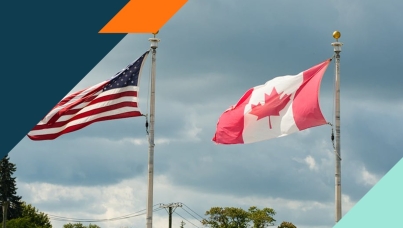Election 2000 - BC
British Columbians Believe Alliance Will Do A Better Job Than Liberals in Managing Key Issues
Vancouver, BC - A federal election campaign poll conducted in BC by the Ipsos-Reid Corporation in the days immediately following the national leaders' debate shows the Canadian Alliance opening a significant gap between itself and the governing Liberals here on the West Coast. With close to half the province's decided voters (48%) currently in the Alliance camp, the party seems poised to win big once again in BC. Meanwhile, with just 10 days left until voting day, support for the governing Liberals has suffered a significant 7 percentage point setback in the province (dropping to 30%), pushing the party back to where it was in the 1997 election, which yielded them 7 seats in the province. Meanwhile, support for the NDP and PC remains unchanged (11% and 6%, respectively), though NDP support is 6 points behind its 1997 tally (17%). "Overall, the poll results suggest that, as the campaign edges into its final week, Liberal hopes for seat gains in BC are unlikely at best, and it's very possible the Alliance will once again walk away with the lion's share of seats in BC," observes Daniel Savas, Senior Vice-President, Public Affairs (Vancouver). "However, with the Liberals and the Alliance running neck-and-neck in Vancouver/Burnaby and on Vancouver Island, the Liberals could well retain many of the seats the party currently holds."
Nonetheless, the poll shows some signs that British Columbians are tired of having the Liberals in power in Ottawa. A solid majority (59%) believes the governing party does not deserve to be re-elected for a third term, up significantly from a mid-campaign Ipsos-Reid poll. And, more people in the province believe a Liberal majority government would be a bad thing for Canada (34%) than see it as a good thing (24%); the reverse is true when it comes to the possibility of an Alliance majority government (43% good thing vs. 34% bad thing).
This overall negative picture of the governing Liberals can be tied to to the BC public's view that the Canadian Alliance is better equipped than the Liberals to provide leadership on a variety of economic, social, and fiscal issues. "The Canadian Alliance has been very successful in establishing itself as a credible alternative to the Liberals, something British Columbians seem to be looking for in this general election," comments Mr. Savas. "The fact that this is the case across all policy areas, including healthcare, speaks volumes about the appeal the Alliance has here in British Columbia. People seem ready for a change, and have responded favourably to what Stockwell Day and his party have been offering."
This BC Ipsos-Reid poll is based on a provincial telephone survey conducted between November 9th and November 14th, 2000 among a representative cross-section of 600 British Columbian adults. These data are statistically weighted to ensure the sample's regional, age and sex composition reflects that of the actual BC according to 1996 Census data.
With a provincial sample of 600, one can say with 95 percent certainty that the overall results are within +4.0 percentage points of what they would have been had the entire adult BC population been polled. The margin of error will be larger for other sub-groupings of the survey population.
Liberal Support (30%) Nears Same Level As 1997 Election; Canadian Alliance (48%) Opens Up 18-Point Gap
Currently, 48 percent of decided voters in BC say they will vote for the Canadian Alliance in this federal election. Support for the Alliance is up only marginally (2 points) from a poll taken a few days ago, but this is enough to open up an 18-point lead over the federal Liberals whose support has dropped a significant 7 percentage points to 30 percent. At this level, the Liberals are close to the level of support they obtained in BC in the 1997 federal election (28%), which gave them 7 seats.
Meanwhile, 11 percent of decided British Columbians throw their support behind the NDP, and 6 percent are in the PC camp. This is unchanged from the last Ipsos-Reid poll. However, NDP support is 6 points behind its 1997 tally. In all, 5 percent say they will vote for other parties, notably the Green party (3%). Thirteen percent are uncommitted at this point in the campaign.
There is every indication that the federal Liberals have a more tenuous hold on their supporters than the Canadian Alliance. For example, Liberal support in BC appears to be somewhat "softer" than that for the Alliance; 46 percent of current Liberal supporters say they are "very certain" of voting for their party of choice, compared to 61 percent who are "very certain" of voting Alliance. Further, the federal Liberals are having more trouble holding on to people who supported them in the 1997 general election than is the case for the Alliance. Currently, only 54 percent of 1997 Liberal voters are intending to vote for the party in 2000 compared to fully 88 percent of 1997 Reform voters who are in the Alliance camp this time around.
Regional and socio-demographic variations in federal party support are as follows:
- The federal Liberals enjoy greater popularity in Vancouver/Burnaby (39%) and on Vancouver Island (33%), where they are in very competitive races with the Canadian Alliance. Liberal support is well behind the Alliance in the suburban communities outside of Vancouver/Burnaby (26%) and in BC's Interior (25%). The Liberals also obtain greater support from women (34% vs. 27% men), and university graduates (42% vs. 27% with high school or less).
- The Canadian Alliance obtains stronger support from people living in the suburban Lower Mainland (60%) and in the Interior of BC (51%), while it is in a more competitive position with the Liberals in Vancouver/Burnaby (39%) and on Vancouver Island (35%). The Alliance receives more support from men (50%, vs. 45% women), older British Columbians (54% of 55+ vs. 42% of 18-34), and people with a high school degree or less (52% vs. 36% of university graduates).
- Support for the federal NDP is consistent across all regions and socio-economic groups in the province.
Solid Majority (59%) Feels Liberals Do Not Deserve Re-Election; But BC Public Doubt Canadian Alliance Will Form Next Government
Currently, 59 percent of British Columbians feel the federal Liberals do not deserve to be re-elected, because one of the other major parties could do a better job of managing the country. This is up a full 8 points over the past few days, indicating a growing reluctance to have the party back in power in Ottawa. Thirty-eight percent believe the Liberals deserve to be re-elected, because they've been doing what's right for the country.
This view is held most strongly in BC's Interior, but over half of the people in all other regions share the same position. Importantly, fully 36 percent of people who voted Liberal in 1997 now believe the party does not deserve to be re-elected.
When asked their views on the possibility of a majority Liberal government, 34 percent of British Columbians feel this would be a "bad thing" for the country, compared to 24 percent who think it would be a "good thing". By comparison, the BC public looks more favourably upon an Alliance majority; 43 percent believe this would be a "good thing" for Canada, while 34 percent see it as a "bad thing".
But, BC Public Doubts Alliance Will Form Next Government; and Many (55%) Do Not Want A Minority Government
Despite the more positive endorsement British Columbians give the Canadian Alliance, the population is evenly split on the chances of an Alliance government in Ottawa. While 48 percent agree the Alliance has a "good chance of forming the next government", 49 percent disagree with this assertion. Still, 74 percent say they would be "surprised" to wake up November 28th and learn the Alliance won the election.
Findings also show no real appetite among the BC public for a minority government; 55 percent say they would not like to see a minority government, while 43 percent would prefer this outcome. With this in mind, is it possible that some voters might vote strategically as a means to ensure a Liberal majority? Poll results suggest this could, and deny the Alliance power in a minority government scenario. For example, 60 percent of the BC public believes a vote for the NDP is a "wasted vote"; a full 34 percent of NDP voters share this view. And, if New Democrats were to vote for another party, their preferred second choice is the Liberals (37%).
British Columbians Choose Alliance Over Liberals When it Comes To Dealing With Key Issues
Stockwell Day and the Canadian Alliance lead all other parties in British Columbians' assessment of which party would do the best job managing key issues. This is true for social, economic, and fiscal matters, which explains to some degree why the Alliance has become the party of choice for the BC public.
British Columbians pick the Canadian Alliance ahead of other parties to:
- Do the best job reducing taxes: Alliance (50%), compared to Liberals (22%), NDP (53%), PC (5%).
- Be best at reducing the federal debt: Alliance (46%), compared to Liberals (26%), NDP (3%), PC (8%).
- Deliver on campaign promises: Alliance (38%), compared to Liberals (17%), NDP (10%), PC (7%).
- Be best at protecting Canada's publicly funded health care system: Alliance (30%), compared to Liberals (22%), NDP (26%), PC (7%).
British Columbians pick both the Canadian Alliance and the Liberals for:
- Do the best job managing the national economy: Alliance (36%) and Liberals (35%), compared to NDP (4%) and PC (9%).
British Columbians are also more likely to pick Stockwell Day and the Canadian Alliance over other parties and leaders for having social and economic issues which are closest to their own (41% and 35%, respectively). Far fewer people in the province pick the Liberals (25% closest on social issues, and 25% closest on economic issues), the NDP (19% and 15%) or the PCs (9% and 7%).
For more information on this news release, please contact:
Daniel Savas
Senior Vice President
Ipsos-Reid
(604) 257-3200



